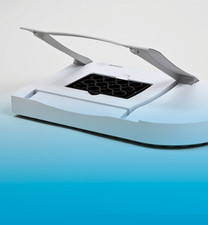No. 17: Technology to accelerate drug development

Brain activity and heartbeats modeled in a petri dish sounds like something you’d find in a futuristic laboratory from the movies. But such marvels are happening right now in scientific research, thanks to a device called the microelectrode array (MEA).
By connecting human cells and tissue to electronic circuitry, an MEA opens up a new avenue to evaluate more drug compounds before they’re tested on people. But the device has had its limitations: With just 64 electrodes, a standard MEA could analyze only one cell sample at a time.
That is, until Georgia Tech scientists reinvented it.
For starters, they custom-designed an integrated circuit – one that offers a more precise reading of the signals sent by cells. They also developed new micro-fabrication methods, so that more electrodes could be placed on an industry standard micro-titer plate.
The ingenuity of these scientists culminated in a fast-growing company, Axion BioSystems. Axion’s industry-leading MEA platform, the Maestro, has 768 electrodes and can analyze as many as 96 cell samples at once. As a result, drug development researchers now have the firepower to model the effects of 96 compounds in a single experiment.
Developing and marketing a successful drug typically takes more than a decade and costs billions of dollars. But the leap forward in MEA technology that Georgia Tech provided just may transform the process forever.
